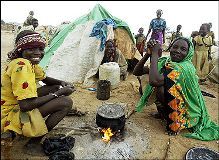Sudan’s Darfur talks suspended, both sides vow to stop fighting
ABUJA, Dec 21, 2004 (IRIN) — African Union mediators said on Tuesday that
faltering peace talks between the Sudanese government and rebels in the
country’s western Darfur region had been suspended until January.
 The move followed several days of stalemate in the latest round of peace
The move followed several days of stalemate in the latest round of peace
negotiations in the Nigerian capital Abuja.
A statement issued by the mediators said the Sudanese government and
rebels had agreed to halt all fighting before they returned to the
negotiating table next month.
“The parties have recommitted themselves to the ceasefire. They’ve agreed
the mechanism that already exists to monitor the ceasefire be
strengthened,” AU spokesman Assane Ba told IRIN.
Peace talks have been taking place intermittently in Abuja since August
against a background of continued skirmishing in defiance of a ceasefire
agreed last April.
But during the latest 11-day session the parties to the conflict agreed on
little more than the need to stop fighting. The rebels walked out of
negotiations after only two days, alleging that government troops had
launched a fresh offensive.
AU monitors in Darfur confirmed that fresh fighting was taking place, but
efforts by the mediators to halt the clashes failed. On Saturday a
helicopter used by the AU monitors to check ceasefire violations was hit
by gunfire from unidentified attackers.
General Festus Okonkwo, the AU’s chief ceasefire monitor said in Abuja
last Friday that vast quantities of weapons had poured into Darfur in
recent weeks, turning the arid region into “a time bomb that could explode
at any moment.”
“The quantity of arms and ammunition brought into Darfur to meet the
present build-up of troops in the region is (so) astronomical that the
issue is no longer whether there will be fighting or not, but when
fighting will start,” the Nigerian general said.
At the latest round of peace talks in Abuja, none of the key issues
concerning the sharing of power and wealth in Darfur were discussed.
Ba, the AU spokesman, said these would definitely be dealt with when the
two sides met again, but in the meantime it was important to stop the
fighting.
“Next time we meet we will go straight into the political issues,” he
said.
No firm date has been set for the January meeting.
The two-year-old conflict in Darfur has sent an estimated 1.45 million
people fleeing from their homes to makeshift shelters within the region
and has pushed a further 200,000 over the border into eastern Chad as
refugees.
The United Nations has described the Darfur situation as the world’s worst
humanitarian crisis. An estimated 2.3 million people in the region are
reliant on aid to survive – more than a third of its total population.
The head of the Sudanese government delegation at the Abuja peace talks,
Majzoub al Khalifa, said his government agreed that “all hostilities
should stop.”
But spokesmen for the two main rebel movements in Darfur, the Sudan
Liberation Army (SLA) and Justice and Equality Movement (JEM), said they
would return fire if attacked.
“The movements didn’t launch any fight, it was the government that did
that and undermined the environment of the talks,” said Abduljabbar Dosa
of SLA. “As long as we’re not attacked, we will not shoot at anybody.”
The AU plans to deploy an international protection force of 3,000 men in
Darfur to monitor the ceasefire and help protect civilians, but so far it
has only managed to deploy 1,000 troops on the ground.
Among them are 196 Gambian troops who left Banjul aboard three German
military transport planes on Monday.
The Darfur conflict erupted in February 2003 when the rebels took up arms
against the government, accusing Khartoum of neglect and oppression.
The Sudanese government tried to put down the rebellion with the help of
an Arab militia force, known as the Janjawid. This has been widely accused
of waging a campaign of ethnic cleansing against black villagers in
Darfur.
The widely ignored ceasefire, agreed in April, was followed by further
agreements in November that were designed to improve security and grant
wider access to humanitarian organisations operating inside Darfur.
The AU subsequently drafted a declaration of principles, which was due to
have been discussed at the session of peace talks just ended.
This included a recognition of the ethnic, cultural, religious and social
diversity of Sudan, a pledge to uphold the unity and sovereignty of the
country, and a recognition of the need for an equitable distribution of
power and national wealth.
